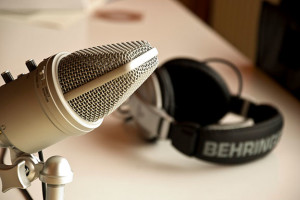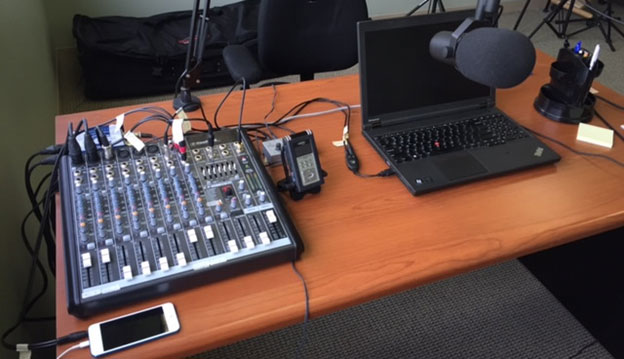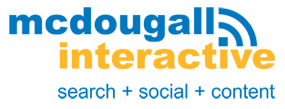
Podcasting is so popular these days that there’s a podcast for almost every topic out there.
However, for every Tim Ferris Show subscribed to by millions of listeners, there’s a hundred other podcasts on the same topic with less than ten listeners—including the podcast creator, his supporting mom, and a few friends.
But get this, for every timid podcaster that is afraid to launch because their show might not be popular, there are countless others building great SEO and social media friendly content from simply talking and sharing their expertise.
So before you invest in a fancy mic and audio editing software or hire an agency for podcasting services, I suggest digging deep within you first. Ask the important but often painful questions people fail to ask themselves before starting a new venture and the clarity will propel you forward, whatever path you choose.
Contemplate the Following Questions before Starting a Podcast
- Why do You Want to Start a Podcast?
Is it because you love talking to people? That may not be enough if you are doing it all yourself because podcasting also involves technical stuff like researching guests, editing audio, uploading it, and a host of other steps.
You need a compelling reason. The reason should be strong enough for you to spend time on a project that might not yield a return for months.
Here are a few of the benefits of podcasting from various perspectives, that will help you determine if starting podcast is right for you and your company.
- Create lots of content directly from your voice without having to write
- Create content that is easy for people to digest at the gym, on their mobile phones or commuting etc.
- Allows you to make transcriptions with lots of text that is great for SEO.
- Question and Answer text is something Google loves!
- Gives you consistent episodes / text and multimedia to share on social media
- Generates content people may link to which helps your SEO
- Allows you to build relationships with other experts by interviewing them for your show
- Gets you in front of other experts audiences
- Creates fans that can also build your email list
- Let’s people hear your voice which can impart trust and makes you more relatable
- Builds your authority, social proof and thought leadership
- Who are You Doing it for?
You should have a clear idea of your ideal listener’s profile way before you record your first episode. Knowing your ideal listener makes it easier to plan your future podcast’s episodes and potential guests.
For instance, a target audience of “small business owners” isn’t necessarily specific enough. But targeting “frugal small business owners with who are interested in retiring early” is detailed enough.
But don’t stop there.
Ask yourself:
- What products or services might they sell? A podcast targeting lawyers and doctors will have a different tone that one targeting salon owners.
- What’s their schedule like? Can they listen to 45-minute episodes, or are 20-25 minute sessions better which are great to listen to on their commute to work?
- What topics are they interested in?
- Are you going to target beginners, or do you want a more advanced crowd?
- Who serves as their inspiration and industry leaders? This gives you a good idea for potential guests.
- What publications do they follow?
Even if you might never get to meet your listeners, you should make them feel like you know them. Researching them helps you understand their feelings, goals, and aspirations.
- Do You Have a Voice Suitable for Podcasting?
Some people sound like chirping birds on the radio, even if they don’t talk like that in real life. If you sound like a kid hyped up on sugar, people might not take you seriously. In that case, you’ll need to learn how to modulate your voice a bit. With a little practice you can speak a little deeper and calmer yet still have plenty of passion and energy.
Another thing to consider is your comfort level in reading scripts and interviewing people. Yes, people might not see your face on a podcast but the pitch of you voice can betray you. Building your confidence can help with this and just might help you offline.
- Can You Write and Research or Hire Someone to help?
Podcasting is similar to writing in a sense that you need to research good topics and questions before you can write a good article—or produce a good podcast episode in this case. The hardest part of recording occurs way before you even touch a mic.
Here are some things you or your podcasting experts will need to do:
- Spend time looking for original and helpful episode ideas for your topic
- Flesh out an idea before creating an episode around it
- Research, fact-checking, brainstorming, outline creation, and pulling it all together into a fact-based outline
- Email people to be a guest on your show
- Do You Understand Your Chosen Topic?
Starting a podcast with everyone in mind is a waste. So you have to choose a topic you know enough of that you can talk about it intelligently to a specific group of people. After all, authority marketing is founded on the idea that you actually have a decent base of niche experience to share.
You don’t need to be the top expert in the world but you should know the basics at least, and who to ask for more information. People can tell if you’re talking about something you don’t know about. Once they sense that, they’ll switch to someone else.
- Do You Have the Time to Sustain a Regular Podcast or the Financial Resources to Outsource it?
While podcasting is easier than writing blog posts for the people talking, if you are also doing the engineering and promotion it can be very time consuming.
Here’s a rough estimate of how long it takes to create a 30 minute episode:
- Pre-record preparation
- 15-30 minutes minimum but can take two hours or more depending on the subject’s complexity.
- Coming up with an idea, researching it, and creating an outline / questions
- Researching and inviting a potential guest if it is not just your team
- Selecting keywords to improve SEO for your podcast content / transcriptions or show notes
- Equipment set-up
- 10 to 15 minutes if you do not have a dedicated place to keep your gear set up. This can be cut back if you use Skype and simple teleconferencing recording system. Not the best quality but the lowest effort.
- Selecting and cueing pre-recorded audio clips for the show
Example of a small podcast studio at McDougall Interactive:

- Actual episode and show recording
- 10 to 60 minutes, depending on your goals. 10-15 minutes is fine for just creating quick content for your blog whereas a deeper podcast show may want to be 25 minutes or more.
- Audio editing
- At least as long as your conversation was.
- This is pretty time consuming because it pays to listen back to the whole post and make sure it is working all the way through. Or if you’re in a pinch make notes of where issues might have been when recording and just edit those as well as the begging and end.
- It can take one hour or more of editing if you have bad audio because your guest’s mobile connection is poor or if you want to splice out numerous mistakes.
- Promotion and back-end work
- 30-60 minutes or more
- Announcing on social media and writing an email blast
- Writing show notes
- Promoting with Facebook ads and or other paid social media promotion
- Asking people to review you on Itunes etc.
- Transcribing the audio into text
- Posting it to your blog (optimized for SEO)
- Posting to Soundcloud, Itunes and Stitcher
Underestimating the time it takes to produce one podcast episode is probably the most common reason why new shows don’t make it past their first 10 episodes.
On the other hand, if you just want some quick content for your blog, and you use a free teleconference recording service, all you have to do is farm out the audio editing, transcriptions and blog post creation / uploading and you will at least get the ball rolling. So it all depends on your goals and what a “podcast” means to you.
- Is there an Active Community Talking about Your Topic?
The answer has to be yes; otherwise you’d have no listeners. But how can you tell exactly if your topic has a good following?
Consider these:
- What’s the keyword search volume for your topic?
- Are there blogs and magazines dedicated to your topic?
- Is there a Reddit thread discussing it?
- Are there Facebook and or LinkedIn groups about it?
- Are their hashtags specific to your topic?
Conclusion
In general, people start podcasts to share their knowledge and build authority in their niche. They want to connect to their audience and build a community.
Others use podcasting to get leads for their business from the consistent SEO and social media friendly content it creates without feeling like a failure if it has a small listening audience. Then there are the hobbyists who podcast about their craft, and monetize it through advertising.
It all comes down to what your motive and goals are in terms of whether or not it will be worth the time. Podcasting can mean different things to different people and that’s ok.
Is podcasting something you think is worth doing and will grow over time or do you see it as a trend that will fade?
